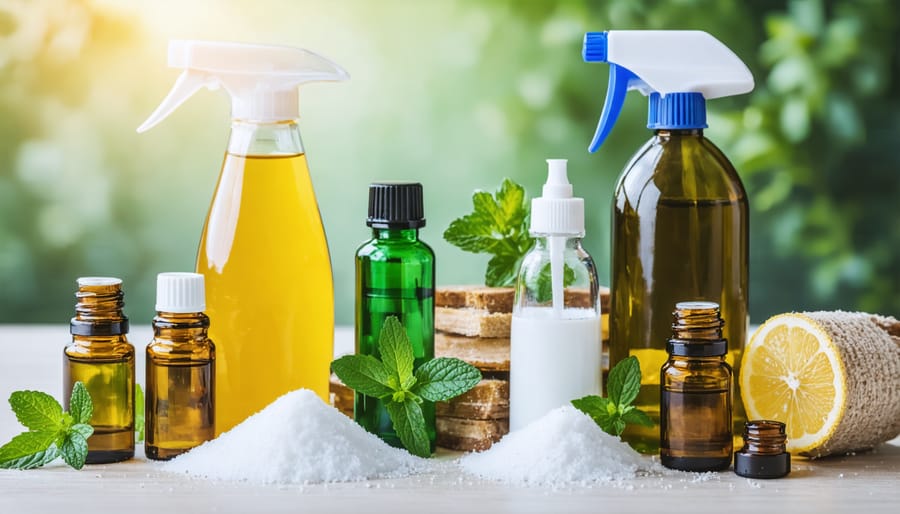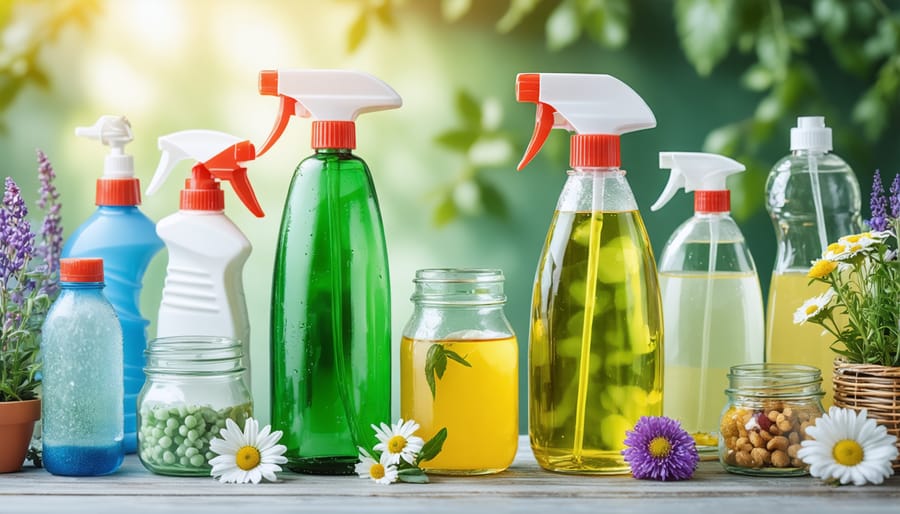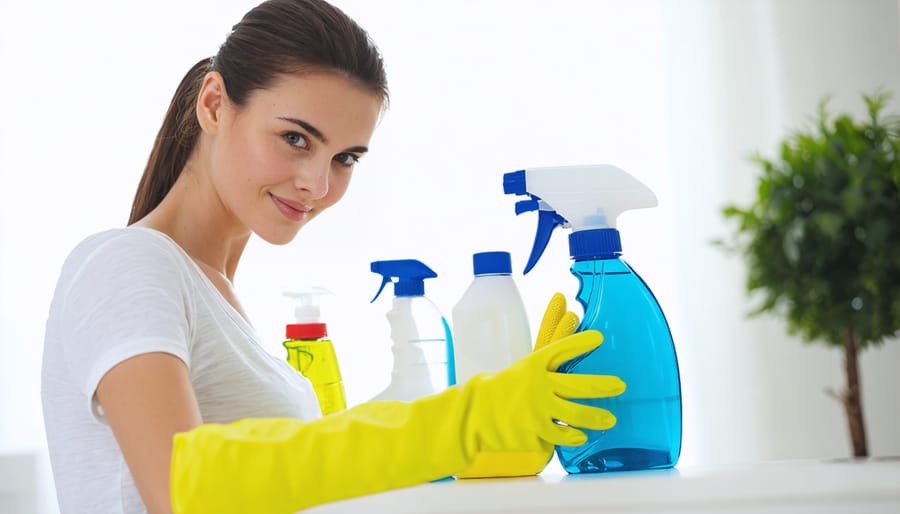Mix equal parts white vinegar and water in a spray bottle for an all-purpose eco-friendly cleaning solution that tackles most surfaces. Create a scouring paste by combining baking soda with a little castile soap to scrub sinks, tubs and toilets without harsh chemicals. Infuse citrus peels in vinegar for two weeks, then strain for a powerful grease-cutting cleaner that leaves your kitchen smelling fresh. With these simple DIY recipes using natural ingredients, you can transform your home into a sustainable haven while effectively tackling dirt and grime.

Essential Ingredients to Have on Hand
White vinegar
White vinegar is a versatile natural cleaner with impressive disinfecting and deodorizing properties. Its acetic acid content effectively kills bacteria, mold, and germs, making it a go-to for sanitizing surfaces, especially in the kitchen and bathroom. Simply mix equal parts water and white vinegar in a spray bottle for a powerful all-purpose cleaner. You can also use undiluted vinegar for tough stains or to eliminate odors in microwaves, dishwashers, and drains. White vinegar’s natural acidity cuts through grease and grime without leaving behind harmful chemical residues, ensuring a sparkling clean home that’s safe for your family and the environment.
Baking soda
Baking soda is a versatile, eco-friendly cleaning powerhouse. Its mild abrasive texture makes it perfect for scouring away stubborn stains and buildup on surfaces like sinks, tubs, and countertops. Simply sprinkle baking soda directly onto a damp sponge or cloth and scrub gently in circular motions. Baking soda also has natural odor-absorbing properties, making it ideal for neutralizing unpleasant smells in carpets, upholstery, and even the refrigerator. Just sprinkle a thin layer onto the affected area, let it sit for several hours or overnight, then vacuum it up for a fresher, cleaner scent.
Castile soap
Liquid castile soap, made from vegetable oils like olive, coconut, or hemp, is a versatile and gentle cleaning option. Its natural ingredients effectively clean without harsh chemicals, making it safe for most surfaces. Castile soap can be used directly or diluted in water for tasks like washing dishes, mopping floors, or spot-treating laundry stains. As a biodegradable and plant-based product, it’s an eco-friendly choice that won’t pollute waterways. Incorporate liquid castile soap into your homemade cleaning arsenal for a reliable, green clean.
Essential oils
Essential oils not only provide a pleasant natural fragrance to your homemade cleaning products, but many also have antibacterial, antifungal, or degreasing properties that can boost cleaning power. Tea tree oil is a popular choice for its antimicrobial benefits, while lemon oil is uplifting and helps cut through grease. Eucalyptus and peppermint oils are also natural disinfectants. When using essential oils, always test first on an inconspicuous area and use in a well-ventilated space. A little goes a long way – use just 5-10 drops per cup of cleaning solution.

9 Simple DIY Cleaning Product Recipes
All-purpose cleaner
Here’s a simple recipe for a versatile all-purpose cleaner that’s safe for most surfaces: In a spray bottle, mix 1 cup white vinegar, 1 cup water, and 30 drops of your favorite essential oil (like lemon or lavender). Shake well before each use. For extra cleaning power on tougher grime, you can increase the vinegar to water ratio. Spray the solution onto the surface and wipe clean with a microfiber cloth or sponge. This eco-friendly cleaner effectively cuts through grease and dirt without harsh chemicals. Always test on an inconspicuous spot first, and avoid using vinegar on natural stone like granite or marble.
Glass & mirror cleaner
To make your own streak-free glass and mirror cleaner, simply mix equal parts white vinegar and water in a spray bottle. For extra shine, add a tablespoon of cornstarch per cup of liquid. Spray the solution onto the surface and wipe with a clean, lint-free cloth or paper towel. For stubborn spots, let the mixture sit for a minute before wiping. Avoid cleaning windows in direct sunlight, as the heat can cause the solution to dry too quickly, leaving streaks. This eco-friendly recipe effectively cuts through grime without the need for harsh chemicals, leaving your glass surfaces sparkling clean. You can also explore what professional window cleaners use for additional insights.
Bathroom scrub
Here’s a simple recipe for an effective tub, tile and toilet cleaner you can make at home with just a few ingredients. In a bowl, combine 1 cup of baking soda, 1/4 cup of liquid castile soap, and 1 tablespoon of hydrogen peroxide. Mix into a paste. If needed, add a bit more baking soda to achieve a thick consistency that will stick to surfaces. Scoop some onto a sponge, scrub the tub, shower walls, or inside the toilet bowl, then rinse thoroughly. The gentle abrasiveness of the baking soda eliminates soap scum and hard water deposits, while the castile soap and hydrogen peroxide help clean and disinfect. Use weekly for a sparkling clean bathroom without harsh fumes or chemicals.
Drain declogger
To naturally unclog drains, start by pouring a pot of boiling water down the drain. Next, pour 1/2 cup of baking soda into the drain, followed by 1/2 cup of white vinegar. Cover the drain with a stopper or rag to contain the fizzing reaction. Let it sit for 30 minutes, then flush with another pot of boiling water. For tough clogs, let the baking soda and vinegar mixture sit overnight before flushing. This eco-friendly method is effective for minor clogs and helps deodorize drains. Repeat monthly as part of your natural cleaning routine to keep drains clear and fresh.
Wood furniture polish
To make a natural wood furniture polish, mix equal parts olive oil and lemon juice or white vinegar in a spray bottle. Shake well to combine. Spray a light mist onto a soft, clean cloth and gently rub the mixture into the wood, following the grain. Buff with a separate clean, dry cloth to remove excess oil and achieve a beautiful shine. This eco-friendly polish nourishes wood, removes dirt and grime, and leaves behind a fresh, clean scent. For best results, test the polish on an inconspicuous area first and avoid oversaturating the wood. Reapply every few months or as needed to maintain a lustrous finish. You might also find tips for determining the right attic fan size useful when managing home ventilation along with maintaining wooden surfaces.
Linen spray
Here’s a simple recipe for a natural linen spray that will refresh fabrics and eliminate odors. Combine 1 cup of distilled water, 1/4 cup of unflavored vodka or rubbing alcohol, and 10-15 drops of your favorite essential oil (like lavender, lemon, or eucalyptus) in a spray bottle. Shake well before each use. Lightly mist the spray on sheets, pillows, curtains, upholstery, or clothing to freshen them up between washes. The alcohol helps the scent linger longer. This eco-friendly fabric refresher is perfect for deodorizing items that can’t be laundered frequently. Plus, you can customize the scent to your liking!
Oven cleaner
Here’s an easy DIY oven cleaner recipe to cut through tough, baked-on grime without harsh chemicals. In a bowl, mix 1/2 cup baking soda with a few tablespoons of water to form a paste. Spread the paste over oven surfaces, avoiding heating elements. Let it sit overnight, then wipe clean with a damp cloth or sponge. For extra scrubbing power on stubborn spots, dip the cloth in white vinegar before wiping. This natural combo effectively breaks down grease and leaves your oven sparkling. Always spot test and avoid using on self-cleaning ovens.
Laundry detergent
To make your own natural laundry detergent, mix 1 cup of grated castile soap, 1 cup of borax, and 1 cup of washing soda in a large bowl. Stir well to combine the ingredients evenly. Transfer the mixture to an airtight container for storage. To use, add 1-2 tablespoons per load, depending on the size and soil level. For an extra boost, include 1/2 cup of white vinegar in the rinse cycle to help remove residue and soften fabrics naturally. This homemade laundry soap is gentle on clothes and skin, while effectively cleaning your laundry without harsh chemicals. Plus, it’s budget-friendly and reduces packaging waste compared to store-bought detergents.
Dishwasher tablets
To make your own eco-friendly dishwasher detergent tabs, mix together 1 cup washing soda, 1 cup baking soda, ½ cup citric acid, ½ cup kosher salt, and 1 tablespoon vinegar in a bowl until well combined. Slowly add water, 1 tablespoon at a time, until the mixture resembles wet sand and holds together when squeezed. Press the mixture into an ice cube tray, compact it tightly, and let the tabs dry for 24 hours. Once completely hardened, remove the tabs from the tray and store them in an airtight container. Use one tab per dishwasher load for sparkling clean dishes without harsh chemicals.
Tips for Storing and Using Your Homemade Products
When storing your homemade cleaning products, it’s best to use clean, airtight containers such as glass spray bottles or mason jars. This will help maintain the potency and freshness of your natural ingredients. Avoid using plastic containers, as some essential oils and acidic ingredients like vinegar can break down plastic over time. Always label your containers clearly with the product name, ingredients, and date of creation. This will prevent confusion and ensure you use the products within their optimal freshness window, typically 3-6 months.
When it’s time to clean, give your homemade products a good shake to recombine the ingredients. For spray cleaners, apply to surfaces and let sit for a minute or two to allow the ingredients to work their magic. Then wipe clean with a damp cloth or sponge. For scrubs and pastes, apply with a sponge or cleaning brush, gently scrub, and rinse well with water.
Homemade cleaners may not have the same instant foaming action as commercial products, but rest assured they are effectively cleaning and disinfecting. The natural ingredients may have more subtle scents compared to artificial fragrances. You can experiment with different essential oil blends to customize the scent to your liking.
Always use caution and wear gloves when handling any cleaning products, even natural ones. Avoid mixing different homemade cleaners together, as some ingredients can react negatively and create dangerous fumes. Spot test cleaners on an inconspicuous area first to ensure they won’t damage or discolor sensitive surfaces. With these simple usage and storage tips, you can confidently switch to eco-friendly, homemade cleaning products and enjoy a naturally clean and fresh home.

Making your own natural cleaning products at home offers numerous advantages. Not only are they safer for your family and pets by avoiding harsh chemicals, but they’re also more affordable and environmentally-friendly. Using simple ingredients like vinegar, baking soda, and essential oils, you can effectively tackle a variety of cleaning tasks while knowing exactly what’s in your cleaning solutions. Plus, many of these ingredients are likely already in your pantry! By embracing DIY eco-friendly cleaners, you can green your home on a budget and feel good about the products you’re using. So why not give these natural cleaning recipes a try? Your home, wallet, and the planet will thank you.
